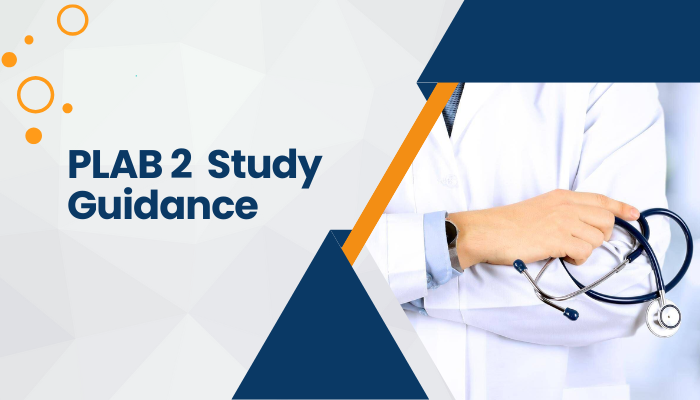The PLAB 2 exam is the crucial second step for international medical graduates (IMGs) seeking complete GMC registration to practise medicine in the UK. Unlike PLAB 1, which tests theory through multiple-choice questions, PLAB 2 is an OSCE-style assessment comprising 16 stations that simulate real NHS scenarios, such as GP consultations, ward rounds, and ethical dilemmas. It evaluates clinical skills, decision-making, and communication, ensuring candidates are competent to work at the Foundation Year 2 level. Passing PLAB 2 confirms your readiness for UK medical practice, patient safety, and professional standards.
“Exams don’t test what you know. They test how well you can show it.” That line stuck with me when I was preparing for PLAB 2, and honestly, it couldn’t be true. This guide breaks it down step by step for you. What PLAB 2 really is. How to Book and Plan Without Stress. What examiners look for (yes, they really do notice if you skip patient concerns). And finally, how to avoid the classic mistakes that cause most candidates to stumble.
Understanding PLAB 2 Exam Basics
PLAB 2 is the second stage of the Professional and Linguistic Assessments Board exam, designed for international medical graduates aiming to practise in the UK. It’s an OSCE-style assessment with 16 clinical stations that replicate real NHS scenarios, from GP consultations to acute ward emergencies. Unlike PLAB 1, which focuses on theoretical knowledge, PLAB 2 tests practical performance, communication, and decision-making. Passing this exam is essential for GMC registration and demonstrates readiness to work safely at a level 2 (F2) setting.
What is PLAB 2?
PLAB 2 is the practical half of the Professional and Linguistic Assessments Board (PLAB) test, required by the General Medical Council (GMC) for international medical graduates (IMGs) who want to practise in the UK.
- It is an Objective Structured Clinical Examination (OSCE) made up of 16 stations.
- Each station lasts 8 minutes, with 5 minutes of reading time before you enter.
- The exam is designed to simulate real NHS scenarios you’ll encounter as an F2-level doctor — from GP consultations to managing acutely unwell patients in hospital.
- You’ll face role players (actors), simulated patients, manikins, or even phone consultations.
In short, PLAB 2 tests not only your clinical knowledge but also your ability to apply it in a realistic, patient-centred way.
Why Do IMGs Need PLAB 2?
Passing PLAB 2 is essential because it is the final step before GMC registration. Without it, you cannot legally practise medicine in the UK.
- The GMC requires PLAB 2 to ensure that IMGs meet the same standards as UK-trained doctors entering the Foundation Year 2 level.
- It is not just about medicine — the exam checks whether you can communicate effectively with patients, relatives, and colleagues, and whether you practise safely in line with NHS standards.
- PLAB 2 is often seen as the gateway to the NHS, because it confirms you’re capable of handling the clinical and ethical challenges of UK practice.
For IMGs, this exam is a transition point: once you pass, you can apply for complete registration and begin working in NHS hospitals or GP settings.
Key Differences from PLAB 1
It’s essential to understand how PLAB 2 is different from PLAB 1:
- PLAB 1: A written multiple-choice exam testing theory, knowledge recall, and clinical reasoning.
- PLAB 2: A performance-based OSCE exam testing how you apply that knowledge in practice.
- What makes PLAB 2 unique:
- It focuses heavily on communication, decision-making, and empathy rather than just knowledge.
- You are marked on three domains: clinical skills, decision-making, and professionalism/communication.
- Unlike PLAB 1, where memorisation helps, PLAB 2 is about thinking on your feet and interacting like a real doctor.
This shift from theory to hands-on skills is why many candidates say PLAB 2 feels much closer to real-life medical practice than any exam they’ve ever done before.
PLAB 2 Exam Format and Assessment
The PLAB 2 exam format and assessment are designed to test how international medical graduates apply their knowledge in real NHS settings. The exam is structured as 16 OSCE stations, each lasting eight minutes, covering consultations, emergencies, practical procedures, and ethical scenarios. Candidates are evaluated on three domains: clinical skills, decision-making, and interpersonal communication. Examiners use a borderline regression scoring system to ensure fairness, focusing on safe and competent practice rather than perfection, reflecting the expectations of an F2 doctor.
Structure of the Exam
PLAB 2 is structured like a large-scale OSCE with 16 clinical stations, each lasting 8 minutes. Before entering, you have 1.5 minutes of reading time to review the instructions. The exam runs for approximately three hours in total, with short rest stations built in to provide a breather.
Each station is set up to simulate a real NHS scenario. You may face an actor playing a patient, a manikin used for a practical procedure, or a phone consultation. The cases cover a wide range of contexts:
- Consultations in a GP clinic or hospital outpatient setting.
- Procedures such as venepuncture, cannulation, or resuscitation.
- Emergencies like chest pain or anaphylaxis.
- Ethical dilemmas such as breaking bad news or consent discussions.
This format ensures you’re tested on how you’d perform in a real UK clinical environment, not just in theory.
Skills You Will Be Tested On
The GMC assesses you against three core domains, each designed to reflect the expectations of a Foundation Year 2 (F2) doctor:
1. Clinical skills
- Of focused histories and performing physical examinations.
- Carrying out basic procedures such as catheterisation or suturing.
- Interpreting investigations like ECGs, X-rays, and blood results.
2. Decision-making skills
In Formulating differential diagnoses based on clinical findings.
- Creating safe, evidence-based management plans.
- Explaining risks, benefits, and next steps clearly to patients.
3. Interpersonal and professional skills
For building rapport and showing empathy with patients.
- Using clear, jargon-free communication.
- Demonstrating professionalism, teamwork, and ethical judgment.
Together, these domains test not just what you know, but how you use it safely and effectively with patients.
How Examiners Mark You
Each station has an assigned examiner who assesses your performance either in person or remotely via video link. Examiners evaluate your performance across the three domains and record your results using structured scoring criteria.
- Competency over perfection: You are not expected to be flawless. Instead, examiners look for safe and professional practice, as well as patient-centred care.
- Marking method: The exam uses a borderline regression scoring system, meaning the pass mark can vary slightly depending on the difficulty of each station. This ensures fairness across different exams.
- Judgement labels: Examiners also classify performances as Unsatisfactory, Borderline, Satisfactory, or Good for standard-setting purposes, though this label does not directly appear in your results.
The key takeaway? Even if you miss small details, what matters is that you show you are a safe and competent doctor who communicates effectively.
Booking and Eligibility for PLAB 2
The Booking and eligibility process for PLAB 2 is managed entirely through your GMC Online account, where available dates are released throughout the year. To be eligible, you must hold an acceptable primary medical qualification, pass PLAB 1, and sit PLAB 2 within two years of that date. Proof of English language proficiency may also be required. Candidates are allowed four attempts, with a possible fifth attempt only after demonstrating additional postgraduate training or supervised clinical experience.
How to Book the Exam
Booking for PLAB 2 is done exclusively through your GMC Online account under the “My Tests” section. You cannot book through third parties, agencies, or coaching centres — the GMC clearly warns that sharing your account details is considered misconduct.
- Available test dates are released throughout the year, but demand is very high, so many candidates experience waiting times of several months.
- The exam is held only in Manchester, UK, at one of two GMC Clinical Assessment Centres. Your booking confirmation will specify the exact location.
- You can only book PLAB 2 after successfully passing PLAB 1.
It’s essential to plan early, especially if you require a visa or have travel restrictions in place.
Eligibility Requirements
To be eligible for PLAB 2, you must:
- Hold an acceptable primary medical qualification from a medical school listed in the GMC’s approved register.
- Have a valid PLAB 1 pass, as PLAB 2 must be completed within two years of your PLAB 1 test date.
- In some cases, provide evidence of English language proficiency (such as IELTS or OET scores) if your documents do not already demonstrate English competency.
This ensures that every candidate sitting the exam is clinically trained, has theoretical knowledge tested by PLAB 1, and meets the GMC’s communication standards for patient safety.
Number of Attempts Allowed
Candidates are permitted a maximum of four attempts at PLAB 2. This policy is in place to maintain high professional standards and patient safety.
- If you fail four times, you can apply for a fifth and final attempt, but only if you can demonstrate further learning.
This additional learning may include:
- at least 12 months of supervised clinical practice with structured feedback from senior doctors, or
- Completion of a recognised postgraduate qualification relevant to clinical practice.
Applications for a final attempt must be supported by official documentation and evidence of professional development.
If you fail the fifth attempt, you are no longer eligible to sit for PLAB 2, meaning you cannot progress to GMC registration through this route.
Costs, Concessions and Cancellations
The GMC clearly defines the Costs, Concessions and Cancellations for PLAB 2 to help candidates plan. The exam fee is £998 from April 2025, payable through GMC Online. Refugee doctors are eligible for a 50% discount on their first two attempts, provided they supply valid refugee status documents. Candidates can cancel or reschedule, but refund eligibility depends on how early the booking is cancelled, with exceptional cases such as illness or visa refusal considered individually.
Exam Fees for PLAB 2
The PLAB 2 exam fee is set and reviewed annually by the General Medical Council (GMC).
- The current fee is £998, effective from April 2025 (previously £981 in 2024).
- Payment must be made securely via your GMC Online account at the time of booking.
- Fees are subject to annual review, and candidates are advised to check the GMC’s official website for the most up-to-date pricing.
This fee covers the full cost of the exam but does not include travel, accommodation, or visa expenses, which international candidates must arrange independently.
Concessions for Refugee Doctors
The GMC recognises the financial challenges refugee doctors may face and offers a 50% fee reduction for PLAB 2.
- The concession applies only to the first two attempts at PLAB 2.
- To qualify, you must provide valid documentation proving UK refugee status.
- The booking must be made online at full price first, and then the refund is processed once refugee status has been confirmed.
This policy ensures that refugee doctors have fair access to opportunities to gain GMC registration and enter NHS practice.
Cancelling or Changing Your Exam
If you need to cancel or reschedule your PLAB 2 exam, the amount refunded depends on how far you cancel in advance.
- More than 42 days before the test date – 10% of the fee will be deducted, and the remainder refunded.
- Between 42 and 29 days before the test date – 50% of the fee will be deducted.
- 28 days or less before the exam – no refund is given; the full fee is forfeited.
However, in exceptional circumstances (such as visa refusal, serious illness, or bereavement), the GMC may consider refunding the cancellation fee if you provide official evidence. Candidates should email the GMC with supporting documents after cancellation.
Preparing Effectively for PLAB 2
The Preparing Effectively for PLAB 2 stage focuses on mastering the practical skills, communication, and professionalism expected in UK practice. Candidates should rely on GMC resources, such as the MLA Content Map, Foundation Programme Curriculum, and Good Medical Practice guidance, to align their studies with exam standards. Success comes from active preparation — practising OSCE-style scenarios, joining study groups, and refining consultation skills. Avoiding common errors, such as poor time management, overusing jargon, or neglecting patient concerns, can significantly boost your performance.
Recommended GMC Resources
The General Medical Council (GMC) provides several official resources that form the foundation of PLAB 2 preparation. These are not optional — they represent the standards you’ll be judged against:
- MLA Content Map – Outlines the scope of the Medical Licensing Assessment, covering core conditions, clinical skills, and behaviours. It ensures your preparation is aligned with UK medical practice.
- Foundation Programme Curriculum – Reflects what is expected of an F2 doctor working in the NHS. Reviewing this helps you understand the level of clinical reasoning and professionalism required.
- Good Medical Practice guidance – Sets the GMC’s expectations for professionalism, ethics, communication, and patient-centred care. Candidates are assessed on these values in every station.
Using these resources ensures your study plan is anchored in the official GMC framework, rather than relying solely on third-party coaching.
Practical Preparation Strategies
Success in PLAB 2 requires hands-on, scenario-based practice rather than simply revising from a textbook. Practical strategies include:
- Form study groups with fellow IMGs to role-play OSCE scenarios. Peer practice helps you spot blind spots and refine consultation flow.
- Practise mock OSCE stations under timed conditions to get used to the eight-minute format and reading-time pressure. Many candidates simulate complete circuits to build stamina.
- Record and review patient interactions to assess body language, tone, and clarity. This also helps you evaluate whether your communication sounds natural and patient-centred.
Practical preparation should mirror the real test environment, building fluency and confidence in handling varied scenarios.
Avoiding Common Mistakes
Examiners often highlight recurring errors that lower candidates’ scores. Avoid these pitfalls:
- Ignoring patient concerns – Jumping straight into diagnosis without exploring what the patient actually worries about. Addressing concerns builds trust and shows empathy.
- Overusing medical jargon – Patients (or simulated patients) won’t always understand clinical terms. Use plain English and confirm understanding.
- Poor time management – Spending too long on history-taking leaves little time for counselling or planning. Practise pacing yourself to cover key points within eight minutes.
Remember: PLAB 2 is not about showing off knowledge, but about proving you can deliver safe, effective, patient-centred care in the NHS.
About the Author
Hi, I’m Dr. Arjun Mehra, an international medical graduate who went through PLAB myself and now mentoring candidates preparing for the journey. I’ve worked alongside NHS supervisors and guided doctors through PLAB 2 workshops in Manchester and London. Over the past five years, I’ve helped hundreds of doctors sharpen their clinical skills and polish their communication style.
Why should you trust what I’m sharing? Because I’ve sat in your shoes—literally in the exam cubicles, heart racing, waiting for that buzzer. I’ve seen what works, what fails, and what examiners really care about. I don’t just write about PLAB 2, I’ve lived it.
I also ground my advice in evidence. For example, Stanford’s Centre for Compassion and Altruism has demonstrated how empathy directly improves patient outcomes—a principle that aligns perfectly with the interpersonal domain of PLAB 2. Combine that with data from GMC examiners highlighting top candidate errors, and you get strategies that are both practical and research backed.
Today, my work focuses on helping international doctors’ transition smoothly into UK practice. Beyond exam prep, I encourage colleagues to join communities like GMC’s Welcome to UK Practice workshops and local study groups. I believe learning should never be a lonely journey.
If you’re preparing for PLAB 2, I invite you to bookmark this guide, share your own tips in the comments, and connect with others who are walking the same path. Together, we’ll make sure you don’t just pass the exam, you’ll be ready to thrive in the NHS.
Your PLAB 2 journey doesn’t have to be overwhelming. At PLAB Scholarship Hub, I am here to guide, support, and connect you with the right resources. Whether you’re looking for preparation tips, study groups, or funding opportunities, this is your community.
Conclusion
The PLAB 2 exam is more than just a hurdle — it’s your gateway to practising safely and confidently as a doctor in the UK. By understanding the exam format, booking requirements, and preparation strategies, you can approach test day with clarity and focus. Remember, PLAB 2 is not about perfection; it’s about showing that you can deliver safe, compassionate, and patient-centred care at an F2 level.
Use the GMC’s official resources, practise OSCE scenarios, and refine your communication skills until they feel natural. Avoid common mistakes, learn to manage time under pressure, and always keep patient concerns at the heart of your consultation.
Passing PLAB 2 is not just about earning GMC registration — it’s about proving to yourself that you can thrive in the NHS. Prepare smartly, practise consistently, and walk into the exam knowing you’re ready for the next step in your UK medical career.


